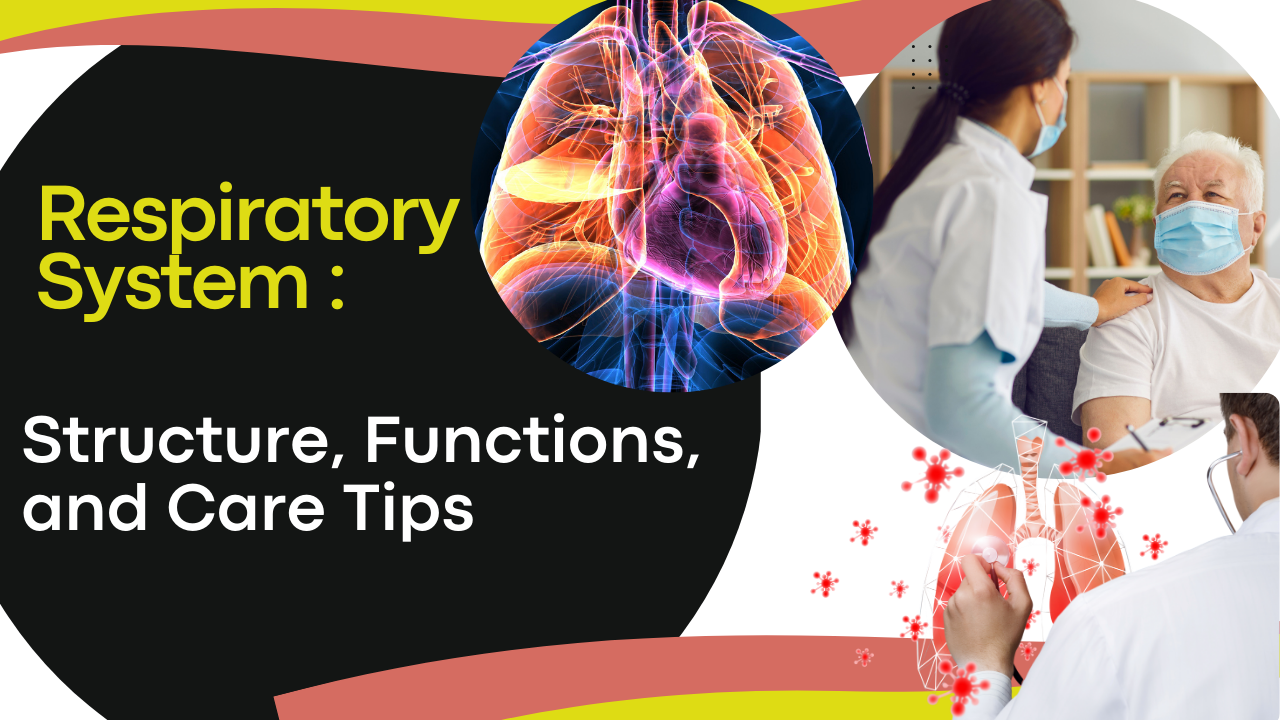Breathing is something we do without thinking, yet it plays a vital role in keeping us alive. Each breath powers the body, allowing oxygen to enter and carbon dioxide to leave. Behind this simple act is the complex work of the respiratory system, which ensures that every cell gets the oxygen it needs to function properly.
The respiratory system includes organs like the nose, trachea, lungs, and diaphragm, all working together to make breathing smooth and efficient. It not only supplies oxygen but also protects us from harmful particles in the air and helps maintain a proper balance of gases in the blood. Its role is essential for energy, brain function, and overall health.
In this article, you’ll learn how the respiratory system works, why it’s so important, and how to care for it. We’ll also share ten practical tips to keep your lungs and airways healthy. Whether you’re a student or simply curious, this guide is both informative and easy to follow.
What Is the Respiratory System ?
The respiratory system is a vital part of the human body that controls the process of breathing, known as respiration. It involves a group of organs and tissues that work together to allow us to inhale oxygen and exhale carbon dioxide. Without this system, our cells would not receive the oxygen they need to produce energy.
When we breathe in, air enters through the nose or mouth and travels down the trachea into the lungs. Inside the lungs, the air reaches tiny air sacs called alveoli, where the actual gas exchange occurs. Oxygen from the air passes into the bloodstream, while carbon dioxide from the blood moves into the alveoli to be exhaled. This process is continuous and happens every moment of our lives.
The respiratory system plays a key role in keeping every part of the body functioning. Oxygen is essential for all body cells to work properly, and removing carbon dioxide prevents the build-up of waste gases. A healthy respiratory system supports clear thinking, energy, and good organ function.
Understanding how the respiratory system works helps us see how important it is. Taking care of this system supports overall health and can improve the quality of life.
Main Functions of the Respiratory System
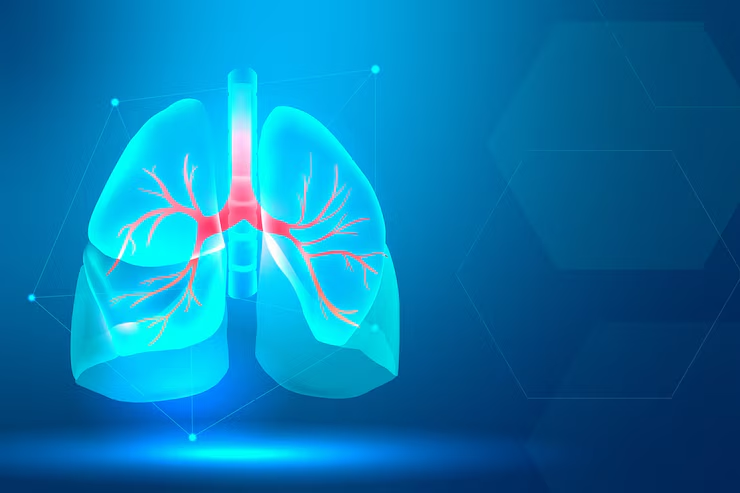
Gas Exchange: Transfers oxygen into the blood and removes carbon dioxide.
Filtration of Air: Filters out particles, pathogens, and pollutants.
Regulation of Blood pH: Helps maintain acid-base balance through the release of CO₂.
Sound Production: Facilitates speech through vocal cords in the larynx.
Olfaction (Smell): Involves nasal passages that detect smells.
Protection: Includes immune defenses against airborne pathogens.
How the Respiratory System Works
When you inhale, air enters through your nose or mouth, travels down the trachea, and moves into the bronchi, which then branch into smaller bronchioles. Finally, it reaches the alveoli. Here’s where the magic happens:
Oxygen diffuses across the alveolar membrane into capillaries.
Carbon dioxide, a waste product of cellular respiration, moves from the blood into the alveoli and is expelled when you exhale.
This gas exchange is continuous and essential. The diaphragm, a dome-shaped muscle, plays a critical role. When it contracts, the lungs expand, creating negative pressure that draws in air.
Importance of the Respiratory System
Provides Oxygen for the Body: Every cell needs oxygen to work properly. Oxygen powers the mitochondria, which produce energy for the body. Without it, cells can start to die in just a few minutes.
Removes Carbon Dioxide Waste: The respiratory system helps remove carbon dioxide, a waste product. If too much builds up, it can upset the body’s balance and harm important functions like heart rhythm and brain activity.
Helps Produce Energy: Oxygen is key for making ATP, the main energy source for cells. The lungs help in this process by exchanging oxygen and carbon dioxide during breathing.
Defends Against Germs: The respiratory system has mucus and tiny hairs called cilia that trap dust, bacteria, and viruses. It also includes immune cells that fight off harmful invaders.
Enables Speech: Breathing air through the vocal cords allows us to speak. Without the respiratory system, talking and other forms of vocal communication wouldn’t be possible.
Balances pH and Body Temperature: By adjusting carbon dioxide levels, the lungs help keep the blood’s pH steady. Breathing out also helps release heat and control body temperature.
Top 10 Ways to Take Care of Your Respiratory System
To maintain optimal respiratory health, prevention and proactive care are key. Below are ten effective strategies to support a healthy respiratory system:
Avoid Smoking and Secondhand Smoke
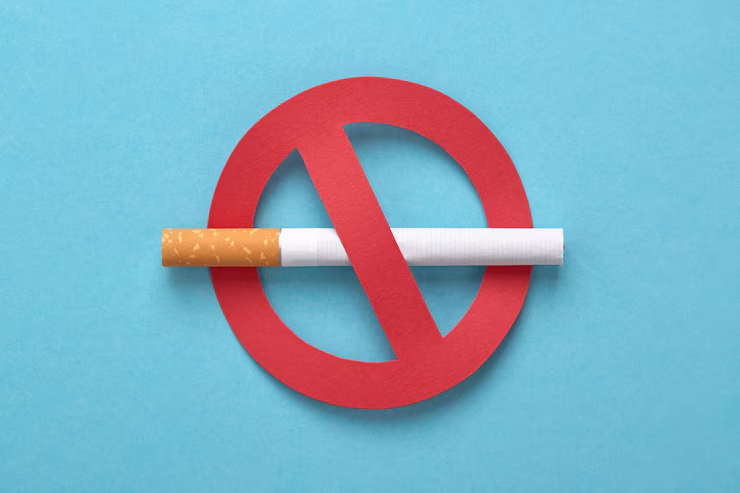
Smoking is one of the biggest threats to the respiratory system. It is the leading cause of serious lung diseases such as lung cancer, chronic obstructive pulmonary disease (COPD), and emphysema. These conditions damage the lungs and make breathing difficult over time.
Cigarette smoke contains more than 7,000 harmful chemicals. Many of these are toxic and some are known to cause cancer. When inhaled, these chemicals harm the delicate tissues of the respiratory system, reducing its ability to function properly and increasing the risk of long-term health issues.
Even people who do not smoke but are regularly exposed to secondhand smoke are at risk. Breathing in smoke from others can still damage the lungs and lead to breathing problems. Protecting the respiratory system means avoiding both smoking and smoky environments whenever possible.
Tip: Seek support to quit smoking through cessation programs, therapy, or nicotine replacements.
Exercise Regularly
Regular physical activity plays a key role in supporting a healthy respiratory system. It helps improve lung capacity, allowing you to take in more oxygen with each breath. This is especially important for maintaining strong breathing over time.
Exercise also strengthens the muscles used for breathing, including the diaphragm and intercostal muscles. When these muscles are strong, the respiratory system works more efficiently, making it easier to breathe during both activity and rest.
Cardiovascular activities like running, swimming, and cycling are especially good for the lungs. They increase heart rate and breathing rate, which boosts oxygen flow and trains the body to use oxygen more effectively. By staying active, you support your respiratory system and overall well-being.
Tip: Aim for at least 150 minutes of moderate-intensity aerobic activity weekly.

Practice Good Hygiene
Many respiratory infections are transmitted through the air or physical contact.
Wash your hands regularly.
Avoid touching your face.
Use tissues when sneezing or coughing.
Disinfect commonly touched surfaces.
Tip: During flu or allergy seasons, wear a mask in crowded areas.
Get Vaccinated
Vaccinations are an important way to protect the respiratory system from harmful infections. Diseases like influenza, pneumonia, and COVID-19 can severely affect the lungs and make breathing difficult. Getting vaccinated helps lower the risk of catching these illnesses.
By staying up to date with your vaccines, you also reduce the chance of spreading these infections to others, especially those with weaker immune systems. This helps protect the overall health of the community and keeps the respiratory system strong and functioning well.
Vaccines don’t just prevent illness—they also reduce how severe the symptoms can be if you do get sick. This means fewer complications, hospital visits, and long-term damage to the lungs. Keeping the respiratory system healthy through vaccination is a simple but powerful step toward better health.
Tip: Consult your healthcare provider annually for recommended immunizations.

Monitor Indoor Air Quality
Poor air quality can have a harmful effect on the respiratory system. Breathing in polluted air over time can lead to problems like allergies, asthma, and other long-term lung conditions. These issues can make it harder to breathe and reduce your overall quality of life.
Indoor air is often filled with hidden pollutants. Common sources include dust, pet dander, and mold, which can trigger allergic reactions and breathing difficulties. Volatile organic compounds (VOCs) from paints, cleaning products, and furniture can also affect the air we breathe indoors.
To protect your respiratory system, it’s important to improve indoor air quality. Using air purifiers, cleaning regularly, and ensuring proper ventilation can help reduce harmful particles in the air. Keeping the air clean supports easier breathing and helps maintain strong lung function over time.
Tip: Use HEPA filters, dehumidifiers, and houseplants. Ventilate rooms frequently and avoid chemical-based air fresheners.
Avoid Environmental Pollutants
Outdoor air pollution is a major threat to the respiratory system. Pollution from vehicles, factories, and wildfires releases harmful substances into the air we breathe. These pollutants can make breathing more difficult and put extra stress on the lungs.
One of the biggest dangers comes from fine particles and gases like ozone. These can enter deep into the lungs and cause inflammation. Over time, this may lead to worsened asthma symptoms, reduced lung function, and other chronic respiratory problems.
To protect your respiratory system, try to limit outdoor activities when air quality is poor. Checking local air quality reports, using masks when needed, and staying indoors during high-pollution days can help reduce your exposure. Clean air is essential for healthy breathing and long-term lung health.
Tip: Check local air quality indices. On high-pollution days, limit outdoor activities and wear a mask if necessary.

Stay Hydrated
Staying well-hydrated is essential for a healthy respiratory system. Water plays a key role in keeping the mucosal linings of the lungs moist and thin. These linings help protect the lungs and support smooth breathing.
When the mucosal layers are properly hydrated, mucus moves more freely through the airways. This makes it easier for the body to clear out dust, allergens, and other unwanted particles. As a result, the respiratory system stays cleaner and works more efficiently.
Proper hydration also lowers the risk of lung infections. When mucus is thin and moves easily, it’s harder for bacteria and viruses to stay in the lungs. Drinking enough water each day supports the respiratory system’s natural defenses and helps maintain clear and healthy airways.
Tip: Aim for 8–10 glasses of water daily. Avoid excessive caffeine and alcohol, which dehydrate the body.
Practice Breathing Exercises
Breathing techniques are a simple yet powerful way to support the respiratory system. They help improve how the lungs work and increase the amount of oxygen that reaches the body’s cells. Regular practice can make breathing more efficient and reduce strain on the lungs.
One helpful method is diaphragmatic breathing, which uses the belly instead of the chest to draw in deeper breaths. Another is pursed-lip breathing, which slows down exhalation and helps keep the airways open. These techniques can be especially useful for people with asthma or other breathing issues.
Yoga-based breathing practices, like pranayama, also support the respiratory system by combining controlled breathing with relaxation. These exercises not only improve lung capacity but also reduce stress, which can benefit overall health. Practicing breathing techniques daily can lead to better oxygen flow and stronger lung performance.
Tip: Spend 5–10 minutes daily doing slow, deep breathing exercises.

Eat a Respiratory-Friendly Diet
Eating nutrient-rich foods is important for maintaining a healthy respiratory system. A balanced diet filled with vitamins, minerals, and antioxidants helps reduce inflammation and keeps the lungs working well. Good nutrition also supports the body’s natural ability to fight infections.
Fruits and vegetables are especially helpful because they contain antioxidants that protect lung tissue from damage. These nutrients fight against free radicals—harmful molecules that can harm cells and increase the risk of respiratory issues. Leafy greens, berries, carrots, and citrus fruits are great choices.
A healthy diet strengthens the immune system, making it easier for the body to defend against respiratory infections. When the respiratory system is supported with good food, it stays strong and functions better. Including a variety of fresh, whole foods in your meals is a simple step toward better lung health and overall well-being.
Best foods for lung health:
Leafy greens
Berries
Nuts and seeds
Fatty fish (rich in Omega-3s)
Garlic and turmeric
Tip: Avoid processed foods and limit sugar and trans fats.
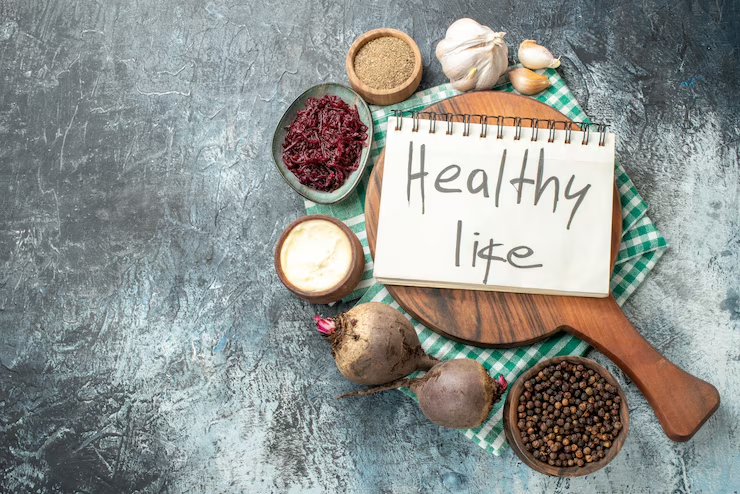
Regular Health Screenings
Regular health checkups are important for keeping the respiratory system in good condition. They help detect early signs of breathing problems before they become serious. Seeing a doctor regularly allows you to track your lung health and catch any changes early.
One useful tool during checkups is the spirometry test. This test measures how well your lungs are working by checking how much air you can breathe in and out. It can help diagnose conditions such as asthma, chronic obstructive pulmonary disease (COPD), and other lung disorders.
Early diagnosis through tests and regular monitoring gives you a better chance to manage or even prevent serious issues. By taking care of your respiratory system through routine medical visits, you can stay healthier, breathe easier, and avoid long-term complications. Prioritizing lung health is a key part of maintaining overall wellness.
Ask ChatGPT
Tip: If you experience persistent coughing, wheezing, or breathlessness, consult a pulmonologist.
Conclusion
In conclusion, the respiratory system is a vital and intricately designed part of the human body that sustains life through the essential process of breathing. It not only ensures a constant supply of oxygen to our cells but also removes harmful carbon dioxide, supports speech, regulates pH, and defends against airborne pathogens.
Given its critical role, maintaining the health of the respiratory system should be a top priority. By adopting healthy lifestyle habits—such as avoiding smoking, staying active, eating a nutritious diet, and minimizing exposure to pollutants—we can significantly enhance our lung function and overall well-being.
In an era of rising environmental pollution and respiratory diseases, proactive care is more important than ever. Understanding and respecting the importance of the respiratory system empowers us to breathe easier, live longer, and enjoy better quality of life. Let each breath remind us of the incredible work our lungs do every single moment.
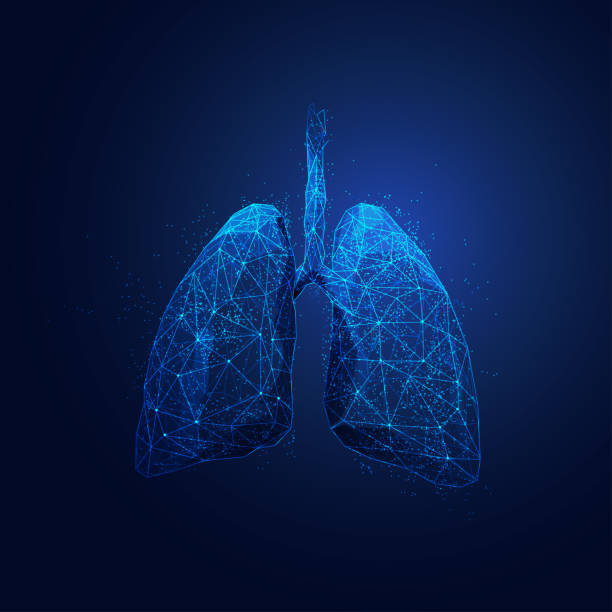
FAQs
Q.1 What is the main function of the respiratory system ?
The primary function of the respiratory system is to facilitate gas exchange—bringing oxygen into the body and removing carbon dioxide, a waste product of cellular metabolism.
Q.2 How can I naturally improve my respiratory health ?
You can improve respiratory health by exercising regularly, avoiding smoking, practicing breathing exercises, eating antioxidant-rich foods, staying hydrated, and reducing exposure to pollutants.
Q.3 What are common diseases of the respiratory system ?
Common respiratory diseases include asthma, chronic obstructive pulmonary disease (COPD), pneumonia, bronchitis, tuberculosis, and lung cancer.
Q.4 How does exercise benefit the respiratory system ?
Exercise strengthens the respiratory muscles, increases lung capacity, improves oxygen efficiency, and helps clear mucus and toxins from the lungs.
Q.5 Why is hydration important for the respiratory system ?
Hydration keeps the mucous membranes in the lungs moist, helping to trap and expel dust, bacteria, and other harmful particles more effectively.

